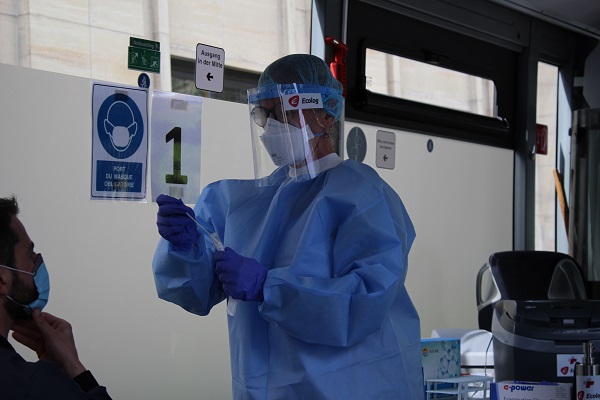 Screening station inside the large-scale testing mobile unit bus;
Credit: MSAN
Screening station inside the large-scale testing mobile unit bus;
Credit: MSAN
Luxembourg's Minister of Health Paulette Lenert presented this morning at a press conference the strategic approach of the second phase of large-scale testing.
The second phase of large-scale testing launched in Luxembourg, under the coordination of the Department of Health, on Wednesday 16 September 2020. Up to 53,000 tests can be carried out per week.
The objective of this second phase is to limit the spread of the new SARS-CoV-2 virus by early identification of positive cases, including among asymptomatic people, and thus quickly break the chains of infection. At the same time, this testing phase should contribute to the close monitoring of the evolution of the virus in the Luxembourg population.
Repeated contingent testing and rigorous contact tracing aim not only to prevent new chains of infection from forming, but also to make evidence available to decision makers.
Health Minister Paulette Lenert stressed: "The large-scale testing project demonstrates the high level of resilience, adaptability and responsiveness of our country to this unprecedented global crisis and will strengthen our preparedness throughout the evolution of the epidemic".
The strategic approach of phase two is based on public health and taking into account the new reality in the face of the pandemic. This structured, targeted and flexible testing strategy is focussed on five pillars. Building on the results of the first phase (which revealed a relatively low prevalence rate), the second phase is intended to be a more flexible and nuanced tool with capacities adapted to the demand for screening and over a prolonged period, capable of speeding up and increasing the necessary capacity instantaneously as the situation evolves.
The strategy consists in guaranteeing flexibility in terms of proactivity, both in terms of the number of tests to be carried out, as well as in terms of target categories and geographic distribution. Consequently, the second testing phase is based on close strategic monitoring of the population as well as more detailed stratification of the population and highly targeted interventions. This nuanced approach allows a more precise grid of the population than under the first phase.
The first contingent "population sampling tests" is expected to contribute to continuous surveillance of the population by applying more or less narrow surveillance meshes according to the overall infection situation and according to an estimate of the risks associated with certain sub-groups of the resident and working population.
The second contingent will be made up of the “population of particularly exposed individuals”, because of its vulnerability or its high risk of exposure (eg: health personnel, nursing homes, etc.), while the “incoming travelers” quota III aims to ensure monitoring of travellers arriving in Luxembourg (residents and non-residents) and seasonal workers.
Finally, the fourth category "reactive tests" is based on variable test capacities and can be used according to current needs, such as the discovery of several positive cases within a group or to allow a large number of tests during a period where positive cases rise significantly. These interventions allow both stationary and mobile reactivity (through mobile teams).
A fifth pillar consists of serological tests which represent a complementary tool to the large-scale test. These make it possible to detect the rate of infection in the past to have a global view of the number of people infected.
As the Health Minister explained, "the second phase will consolidate Luxembourg's position as a pioneer in large-scale diagnostics and will be an integral part of the government's policy to fight the virus, ideally until the end of the crisis in allowing special attention to be paid to the monitoring of specific target groups".
Participation in large-scale testing is by invitation, sent by the Department of Health. Those invited can make an appointment online (www.covid19.lu) using a personalised, one-time use access code, which is valid for two weeks. The test is free and is performed by pharyngeal (throat) swab at one of the eight available testing stations.
“If you are invited, get tested! We are all part of the solution”, concluded Minister Paulette Lenert.
The second phase of large-scale testing is scheduled until March 2021.








